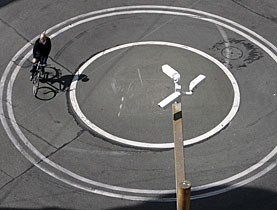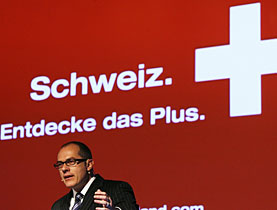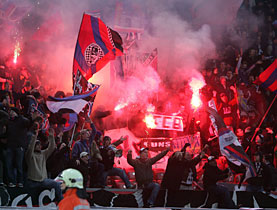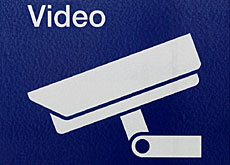Big Brother will be watching during Euro 2008

Geneva is to install video surveillance cameras for June's European Championships - despite a fairly low risk of trouble in the city during the football tournament.
While still at a small level compared with other European countries, the use of video surveillance is a growing phenomenon in Switzerland. Yet it is not properly discussed in the public sphere or monitored, says a Swiss expert.
The Geneva city government agreed on Thursday to provide local police with eight cameras worth SFr4.7 million ($4.3 million) for use during the two-week tournament – and probably beyond. The system will monitor the public in the busiest parts of the city: Plainpalais, the main fan zone, the La Praille stadium, and the Etoile and Rive districts.
“The cameras will allow for general surveillance, not of particular individuals, and will enable operational and strategic decisions to be taken,” police spokesman Eric Grand-Jean told swissinfo.
But he admitted that local authorities didn’t have any particular concerns about violence.
“We are looking forward to a sporting and festive event with a lot of people – 75,000 for the first match, both at the stadium and at the fan zone; it should take place without any particular problems.”
Smile!
Swiss researcher Francisco Klauser says that compared with Britain, with around four million cameras, or Germany and France, Switzerland remains a small player in the surveillance world. But he says surveillance is a fast-developing phenomenon that is not discussed enough and the public has a passive approach.
“There could be 40,000 [cameras], or fewer, but there could also be much more, up to 100,000,” he said, with most cameras being private and only a handful of public schemes.
Klauser’s previous research into video surveillance revealed a 60 per cent public acceptance rate.
But he nuances this figure: “If you dig deeper, you find that if people could choose they would prefer personal assistance by police officers or private security organisations; they also don’t really accept CCTV in residential areas or public squares – only in anonymous areas.”
As video surveillance is not present in people’s everyday lives in Switzerland, the preventive effect is limited, both in terms of reducing heightened feelings of insecurity and impact on long-term crime figures, he said.
“The instrument itself is not bad; it’s how you use it,” Klauser added. “What is also worrying is that the population has nothing to say or doesn’t want to say anything.”
With the development of new face and behaviour recognition technologies, it’s all the more important to speak about it, he said.
Security worries
Geneva will be hosting games between Turkey, Portugal and the Czech Republic.
Last December’s draw means that Geneva has avoided the major security headache of welcoming nations with large, rowdy followings, such as those of Germany or the Netherlands. England failed to qualify.
Up to now, security, alongside noise and the cost for the taxpayer, has been the main Euro 2008 concern in Switzerland rather than football.
As well as the surveillance system, which is also being considered in Lucerne, some 15,000 troops have been made available to the host cities during the tournament.
Between 500 and 1,000 police officers from France and Germany will also be on hand during the games. In addition, hooligan spotters will be present alongside fan liaison officers.
The host countries, Switzerland and Austria have combined with neighbouring countries, participating nations and the central European police agency, Europol, to make sure they have all bases covered.
Switzerland, like Austria, has also introduced tough new laws banning known troublemakers from travelling to the tournament or attending matches and has set up a hooligan database.
swissinfo, Simon Bradley in Geneva
There are no federal or cantonal laws governing video surveillance, but certain cantons are studying the question.
For the moment, private areas, such as car parks, shopping centres and stations are allowed to install cameras.
The police have the right to film but can only use the images with a judge’s agreement.
This surveillance regime is covered by federal data protection law: cameras must be indicated, images must be wiped after 24 hours and cannot be transferred to a third party unless there is a legal investigation underway and their use must be justified.
Co-hosts Switzerland and Austria qualified automatically for the tournament, which takes place from June 7-29, 2008.
The 31 games will be played in four cities in Switzerland (Basel, Bern, Geneva and Zurich) and four cities in Austria (Innsbruck, Klagenfurt, Salzburg and Vienna). The final will be held in Vienna on June 29.
Switzerland will play their three group matches in Basel.
Eight title winners took part in the draw on December 2, with Denmark the only previous champions not to have qualified. England are the other notable absentees.
Poland and Austria are the only two countries taking part in the tournament for the first time.
Up to 5.4 million people are expected to travel to watch games at the four main stadiums and on big screens in Switzerland during the three-week tournament.
The security operation is expected to cost SFr64 million ($56 million), of which SFr28 million will be paid by the cantons.
Bern will host the Police Information and Coordination Centre (PICC), the nerve centre of security operations for both Switzerland and Austria during the tournament.

In compliance with the JTI standards
More: SWI swissinfo.ch certified by the Journalism Trust Initiative




You can find an overview of ongoing debates with our journalists here . Please join us!
If you want to start a conversation about a topic raised in this article or want to report factual errors, email us at english@swissinfo.ch.